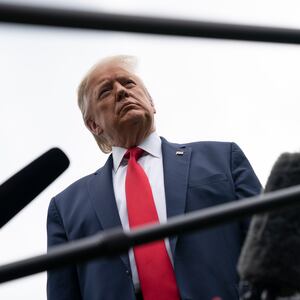How can you sue Donald Trump? Let us count the ways. One of the many private lawsuits filed against Trump in the last three years, this one for an allegedly fraudulent investment scheme promoted by Trump and his kids, made headlines (again) earlier this week when a New York judge allowed the case to proceed. The case offers a window into the kinds of activities allegedly used by the Trumps to generate income, and what it might reveal moving forward may not be great for Trump as he heads towards the November election. So what exactly is the case about?
The lawsuit goes back to October 2018, when plaintiffs filed a federal class action suit against Trump, his three eldest children (Don Jr., Eric, and Ivanka), and the family business for their role in an alleged pyramid scheme that caused them to suffer significant financial losses. The lawsuit initially included a civil RICO claim—essentially claiming that the Trump Organization operated as a criminal enterprise—which was dismissed by the court in July 2019.
White collar defense lawyer and former federal prosecutor Ken White explained to me that the dismissal of the RICO claim is not surprising, given both the complexity of the civil RICO statute and the reluctance of judges to entertain such claims outside the criminal context. However, the judge allowed the plaintiffs to proceed on their remaining claims of fraud, false advertising, and unfair competition—which ultimately constitute the real meat of the lawsuit.
The crux of the plaintiff’s 160-page complaint centers around a company called ACN, which offered a “business opportunity and training programs” for aspiring entrepreneurs. ACN had a multi-level marketing business model which required investors to pay a hefty membership fee to join as an “independent business owner” (IBO), and then additional fees for ongoing training seminars and conventions. IBOs could make commissions by selling ACN’s products, which included reselling third-party telephone and internet plans and proprietary ACN “videophones.”
But IBOs were told they could earn the most money by recruiting new people to join up as IBOs and earning commissions on their recruits’ “downline” sales. These new IBOs, in turn, would pay the initiation fee, attend in the trainings, recruit more members... and so on, rinse and repeat. In short, the model is alleged to be a textbook pyramid scheme, which the Federal Trade Commission describes as a business where the focus is on members recruiting new people to continue to generate income for the top-level owners, rather than on selling actual products. Most of the plaintiffs allege that they made no money at all; one made $38.
This is where the Trump family comes in. The plaintiffs allege that the Trumps’ role in endorsing ACN was central to their decision to invest in it. Specifically, the plaintiffs note that Donald Trump was featured prominently in ACN’s promotional materials and videos, with Trump personally attesting to the earning potential offered by ACN, touting his own experience and knowledge of ACN’s profitability to investors (the complaint notes that ACN was even featured on an episode of Celebrity Apprentice).
In reality, the plaintiffs charge, Trump had done zero due diligence on any aspect of ACN’s business, and was in fact being paid millions of dollars by ACN to lend his name and presence to their recruitment efforts, something that was not disclosed to potential investors in violation of FTC guidelines. The complaint also alleges that the Trump Organization engaged in a “quid pro quo” (sound familiar?) with ACN, whereby individuals affiliated with ACN bought property and held events at Trump’s golf courses.
But wait, there’s more. According to the complaint, the Trumps found the ACN agreement so lucrative that they entered into two other multi-level marketing schemes. One was with a company called Ideal Health, rebranded as “The Trump Network,” which sold dietary supplements and multivitamins.
As with ACN, the plaintiffs claim that this business scheme in reality offered no realistic possibility for investors to make money, despite Trump’s assurances to the contrary. The second venture, with a company called Business Strategies Group, renamed “Trump Institute” (which was part of a business plan with Trump University), charged thousands of dollars for seminars that promised to reveal Trump’s “secrets to success”—but which in reality, according to the plaintiffs, used materials that were not even created by Trump and were actually plagiarized from other sources.
Trump Organization lawyers have told The Washington Post that "the allegations completely meritless... [and] relate to events which took place nearly a decade ago and are well past the statute of limitations."
Whether the plaintiffs will succeed on their claims remains to be seen. David Friedman, a law professor at Willamette University who specializes in marketing and advertising law, says that these kinds of lawsuits are tough to win, but that the facts alleged in the complaint present a very strong case under many state consumer protection laws.
What Trump fears more than losing, however, is discovery. The judge in the case, Lorna Schofield, denied an earlier attempt by Trump’s lawyers to have the case moved to arbitration, which would have shielded the case from public view. This ruling was a big blow for the Trumps. “That was their last grasp,” Friedman says, “at being able to litigate this as they would want to in a classic Trump lawsuit—in secret.”
In her ruling this past Monday, Judge Schofield denied the Trumps’ request for a stay in further proceedings until her earlier ruling on arbitration can be appealed—which means that the plaintiffs can move forward with discovery requests to prove each of their (many and varied) allegations. What the plaintiffs uncover in discovery can become public, which could be Trump’s worst nightmare in an election year.
For the claim involving The Trump Network, for example, the plaintiffs can request discovery to prove that Trump made false and baseless claims regarding the effectiveness of the company’s dietary supplements—particularly inconvenient against the backdrop of his current promotion of the drug hydroxychloroquine to treat coronavirus.
Discovery could also open the door to regulatory enforcement by state attorneys general, in the same way they have done with Trump University and the Trump Foundation. And if punitive damages are on the table, the court could require Trump to file a financial disclosure report, potentially making an end-run around his continued legal attempts to keep his finances hidden.
Before you get out the popcorn, however, remember that the Trumps can always use their favorite “trump” card: a settlement offer. This is how they have ended previous lawsuits that could have revealed the inner workings of the family business. If they do it here, well… we’ll just have to wait for the next inevitable lawsuit to try again.







